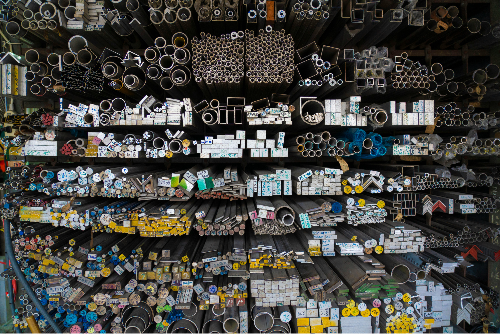The Strategic Importance of Integrated Planning in Construction Projects: Efficient Use of Machinery
- news and press

- Aug 21, 2025
- 4 min read
The Strategic Importance of Integrated Planning in Construction Projects: Efficient Use of Machinery
Summary
The performance of construction projects depends on the coordinated deployment of three critical resources: labor, machinery, and materials. While each area must be managed individually, an isolated approach leads to inefficiency, cost overruns, and delays. The most successful projects adopt an integrated planning approach, combining labor availability, equipment scheduling, and just-in-time delivery of construction materials into a single coherent framework.
Introduction
The construction sector operates under increasingly tight deadlines, higher cost constraints, and growing labor shortages. Projects often fail not due to technical errors but because of resource mismatches.
Shortages of skilled labor create bottlenecks.
Hired machinery incurs unnecessary costs if not used optimally.
Materials delivered too early or too late cause congestion, waste, or downtime.
Machine Planning
Machines such as cranes, excavators, concrete pumps, as well as tools and other equipment, significantly increase productivity but also represent a substantial cost—especially when rented. Precise planning is essential to avoid unnecessary expenses.
“Share Resources. Reduce Operational Costs.”
In construction, every resource represents significant value. Heavy machinery, storage space, transport vehicles, and even skilled labor are major investments. Yet many of these resources remain underutilized for large parts of the project cycle. Idle cranes on-site, unused storage facilities, or half-empty trucks all contribute to higher overhead costs and tied-up capital.

The solution lies in a smarter approach: sharing resources between companies and projects. By moving away from isolated ownership models and adopting safe, coordinated resource sharing, construction companies can optimize utilization, reduce operational costs, and strengthen their competitive position.
Qonnected Logistics BV’s Q-platform provides the infrastructure to make this possible—allowing companies to achieve efficiencies previously out of reach.
The Challenge of Underutilization
Construction companies often face resource mismatches:
A tower crane is needed intensively for three months but then remains idle for weeks.
A vehicle fleet is fully used during peak work but remains largely idle afterward.
Storage sites are rented year-round, while material needs fluctuate.
The Concept of Shared Resources
Resource sharing is not a new idea. Informal lending of machinery and subcontracting has existed for decades. However, these methods often lacked transparency, reliability, and efficiency.
Our platform transforms this process into a structured, safe, and data-driven system. Construction companies can:
Offer available machinery, storage facilities, or transport capacity.
Search for resources they need, exactly when they need them.
Record usage via standardized contracts with clear agreements on price, scheduling, and liability.
By creating a trusted ecosystem, uncertainty disappears, and companies can deploy resources with the same confidence as if they owned them—but without the financial burden.
Benefits of Resource Sharing
Lower Operational Costs
Reduced equipment costs: Companies do not need to purchase or rent individually.
More efficient use of storage: Reduces unnecessary warehouse or site rental.
Lower transport costs: Shared vehicle use increases load efficiency and reduces trips.
Better Asset Utilization
Resources that would otherwise remain idle stay actively used.
Companies earn revenue from underutilized assets by making them available to others.
Data insights support better future investment decisions.
The Q-platform also uses its own machinery and tools, where possible already emission-free.
Greater Flexibility
Access to specialized machinery without long-term commitments.
Ability to scale activities up or down based on demand.
Avoid overinvestment in assets not needed continuously.
Stronger Partnerships
Collaborations between companies become easier and more transparent.
Small companies gain access to resources normally out of reach.
The sector benefits from a more balanced distribution of capital-intensive assets.
How It Works
Secure Listings: Companies list assets with specifications, availability, rental conditions, and location.
Smart Matching and Planning: The platform connects supply and demand, using filters based on project schedules and requirements.
Contract & Compliance: Standardized contracts clarify liability, insurance, maintenance, and costs.
Usage Tracking: Digital logs track who used what, when, and under which conditions.
Data Insights: Companies gain insights into utilization, supporting strategic decisions about ownership or rental.
The Q-platform also manages invoicing and logistics of machinery and tools.
Practical Example
A mid-sized construction company needed an additional excavator for a two-week project. Instead of renting at a high short-term cost, the company used the platform to deploy an unused excavator from a neighboring contractor.
Result: 30% cost savings compared to the market rate. The owner earned revenue from a previously idle machine. Both parties benefited, and the project stayed on schedule without extra costs.
The Strategic Advantage
In a sector with shrinking margins and rising competition, efficient resource use directly impacts financial performance. Companies embracing resource sharing:
Operate with lower overhead costs.
Gain faster access to essential resources.
Reduce their ecological footprint through fewer duplicate purchases.
Resource sharing also aligns with key industry trends:
Sustainability: Fewer machines produced and transported reduces impact.
Digitalization: Data-driven asset planning becomes the norm.
Resilience: Companies are less vulnerable to supply chain disruptions.
Conclusion
Every idle machine, empty warehouse, or half-filled truck represents missed opportunities. In modern construction, efficiency is not optional—it’s the difference between profit and loss.
By using a safe, transparent, and efficient platform for resource sharing, construction companies can:
Reduce operational costs.
Optimize asset utilization.
Strengthen their competitive position.
The future of construction is collaboration.
By sharing resources, companies not only save money—they build smarter, faster, and stronger.
Read more: https://www.qonnected-logistics.com/nl/q-slp



Respecting and valuing workers is vital for the future of construction. Glorious Builders, among the trusted Construction Companies in Pakistan, prioritizes teamwork, safety, and a supportive culture to ensure long-term success.